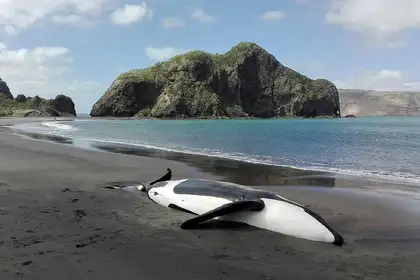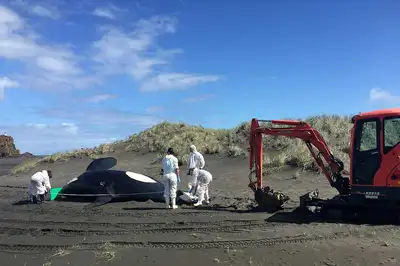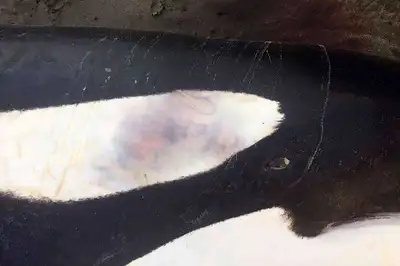
Orca washed up on Whatipu Beach [supplied: Charles Formery]
A Massey University marine conservation team is mobilising to investigate the death of a killer whale, or orca, washed up on Auckland’s west coast at Whatipu Beach with suspected blunt force injuries.
Killer whales are considered nationally critical in New Zealand, with known threats documented to include fisheries interactions and boat strike.
The marine mammal was reported yesterday to the Department of Conservation who spoke with local iwi to seek permission to undertake a post-mortem investigation.
The Massey team will mobilise later today to perform a necropsy to determine likely cause of death, and to also take biological sampling to assess diet and pollutant loads in the adult male whale.

Massey staff on the scene.
The team is led by Coastal-Marine Research Group Director, Dr Karen Stockin.
“Photographs taken by Department of Conservation rangers late yesterday show possible blunt force trauma to the head. At this stage it’s too early to speculate what the cause of such trauma maybe although boat strike is an obvious consideration,” said Dr Stockin.
The team hope to learn more later on today once the carcass has undergone examination.
Marine mammals in New Zealand are legally protected under the Marine Mammal Protection Act (1978). Anyone who accidentally kills or injures a marine mammal is required to report the incident to a fishery officer or the Department of Conservation within 48 hours.
The Marine Mammal Protection Regulations (1992) covers commercial whale and dolphin watching activities, and incidental recreational interaction. Under these regulations vessels must avoid rapid changes in both speed and direction and not exceed speeds faster than the slowest mammal within a vicinity of 300 metres. Vessels travelling at speeds over 15 knots are more likely to kill a whale or dolphin if they hit it, and can still cause severe damage if travelling over five knots (or no wake speed).

Close up pictures of the orca and its injuries [supplied by Department of Conservation.